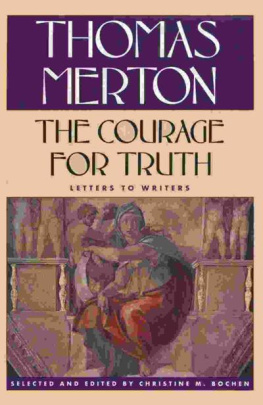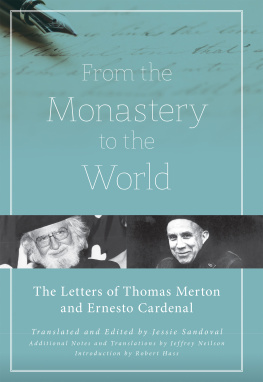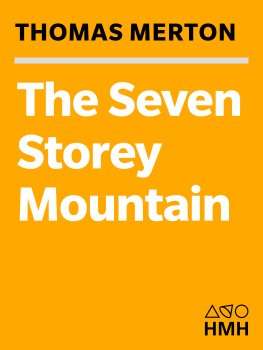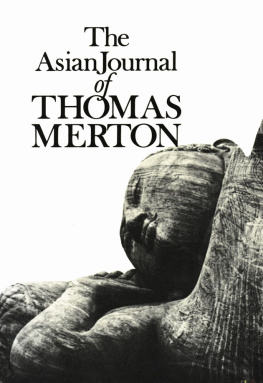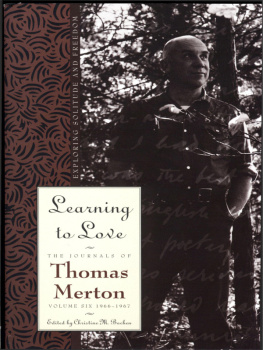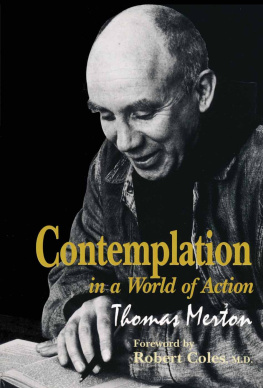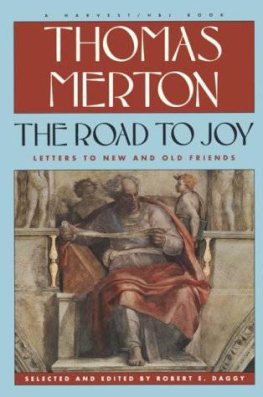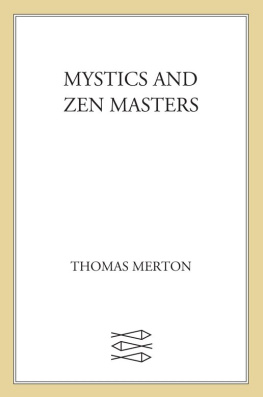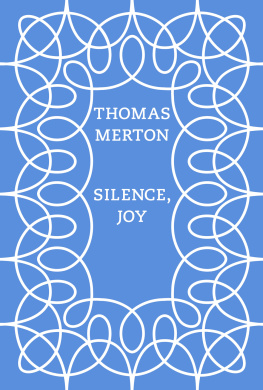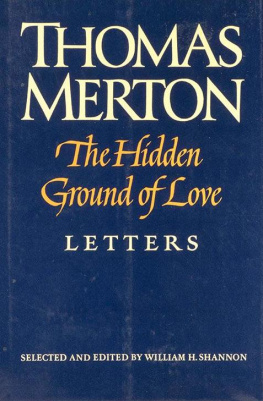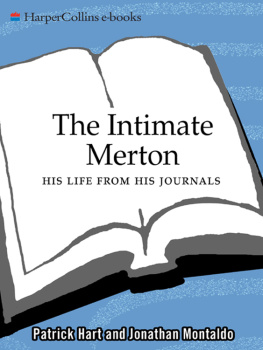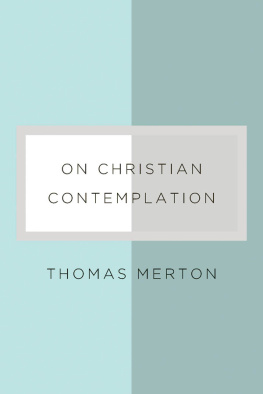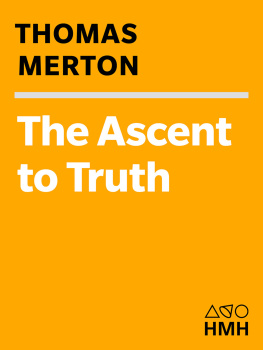Thomas Merton - The Courage for Truth: The Letters of Thomas Merton to Writers
Here you can read online Thomas Merton - The Courage for Truth: The Letters of Thomas Merton to Writers full text of the book (entire story) in english for free. Download pdf and epub, get meaning, cover and reviews about this ebook. year: 1994, publisher: Mariner Books, genre: Art. Description of the work, (preface) as well as reviews are available. Best literature library LitArk.com created for fans of good reading and offers a wide selection of genres:
Romance novel
Science fiction
Adventure
Detective
Science
History
Home and family
Prose
Art
Politics
Computer
Non-fiction
Religion
Business
Children
Humor
Choose a favorite category and find really read worthwhile books. Enjoy immersion in the world of imagination, feel the emotions of the characters or learn something new for yourself, make an fascinating discovery.
- Book:The Courage for Truth: The Letters of Thomas Merton to Writers
- Author:
- Publisher:Mariner Books
- Genre:
- Year:1994
- Rating:4 / 5
- Favourites:Add to favourites
- Your mark:
- 80
- 1
- 2
- 3
- 4
- 5
The Courage for Truth: The Letters of Thomas Merton to Writers: summary, description and annotation
We offer to read an annotation, description, summary or preface (depends on what the author of the book "The Courage for Truth: The Letters of Thomas Merton to Writers" wrote himself). If you haven't found the necessary information about the book — write in the comments, we will try to find it.
The Courage for Truth: The Letters of Thomas Merton to Writers — read online for free the complete book (whole text) full work
Below is the text of the book, divided by pages. System saving the place of the last page read, allows you to conveniently read the book "The Courage for Truth: The Letters of Thomas Merton to Writers" online for free, without having to search again every time where you left off. Put a bookmark, and you can go to the page where you finished reading at any time.
Font size:
Interval:
Bookmark:

Table of Contents
Thomas Merton was born with a passion for writing. As a small child, before he could read, he loved to look at books. All his life he was a voracious reader, a compulsive notetaker, and a committed writer. When he came to the Abbey of Gethsemani in 1941, he expected he would be required to give up his writing. Fortunately, he had abbots throughout his monastic life who respected this God-given gift and wisely encouraged him to use it. Just as monasticism was the way in which Merton specified his baptismal commitment, the vocation of writing remained a significant element of his living out the monastic life.
Merton not only wrote extensively on the contemplative life but, convinced that it was accessible to everyone, managed to make contemplation a household word. Numberless people are grateful to him for this. Because he saw contemplation not as a separate compartment of life but as an experience that broadened lifes horizons, he began in the troubled sixties to write books and articles of incisive social criticism. Merton was not a spiritual writer in the same way as people like Abbot Columba Marmion or Hubert Van Zeller, who were content to remain in a single genre. While he wrote with joy and generosity in the field of spirituality, a good bit of Mertons heart always remained in the literary world he grew up in. Especially in his later years he turned to the kind of writing that had attracted him at least since the time he had been the youthful editor of the literary journal at Oakham school in Englandnamely, to a more creative kind of writing and to forceful and impressive literary criticism.
Merton kept in touch with literary people and looked forward to their visits to Gethsemani. John Yungblut, who has written some fine books on mysticism, told me of visiting the monastery in 1967 with his wife, June. He had come with the desire to discuss mysticism with the renowned monk, but in the course of their talk he made the mistake of telling Merton that June was writing a dissertation on Samuel Beckett. Mysticism was quickly left behind and the theatre of the absurd became the center of attention.
Mertons correspondence with some of the outstanding men and women of letters who were his contemporaries is huge. He encouraged young writers. He felt a special affinity with writers of Latin America and wrote to many of them, especially the poets. What gives this fourth volume of the Merton correspondence its distinctive identity is the fact that in these letters we meet the literary Merton. If anyone wonders what kind of writing Merton would have done had he never entered the Abbey of Gethsemani, these letters offer a hint of the direction he might have taken. This is not to say that Merton doffed his monastic hood when he donned his literary hat. No, his life, especially in his later years, was more or less an integrated whole. Just as his literary background and interest influenced the way he wrote about spirituality (and made it so different from the work of other writers in the field), so his literary worksin a more hidden yet no less telling wayrenect and embody his spirituality.
As general editor of the Merton Letters, I want to express to Dr. Christine M. Bochen my admiration for her careful selection of letters and for the superb editing she has done, with a personal touch that enhances the readability and attractiveness of this volume.
WILLIAM H. SHANNON
General Editor
The Courage for Truth is devoted to Thomas Mertons letters to writers. Mertons passion for writers and writing began in his youth; his autobiography, The Seven Storey Mountain, is filled with the names of writers he was readingWilliam Blake, Ernest Hemingway, Aldous Huxley, D. H. Lawrence, Gerard Manley Hopkins, Evelyn Waugh, Federico Garcia Lorca, Jacques Maritain, and many others. There were also numerous writing efforts by Merton during his early yearsa prize-winning essay on the modern novel that he wrote at the Oakham school in England; humorous pieces published in the Columbia College Jester; a book review in The New York Times; and several novels he had submitted unsuccessfully to publishers, one of which (written in 1941) was published as My Argument with the Gestapo in 1969. In his student years, Mertons closest friends were persons who shared his passion for things literary. Contrary to his expectations when he entered the Abbey of Gethsemani, Merton continued to write. Some of his early writing was suggested by his first abbot and served the needs of the order; other work, like his poetry, was much more his ownfor example, A Man in the Divided Sea. With the publication of The Seven Storey Mountain in 1948, it was evident that the monk always was and always would be a writer.
In the three volumes of Mertons letters already published in this series, there are many addressed to writersDaniel Berrigan, Dorothy Day, D. T. Suzuki, Erich Fromm, Mark Van Doren, Etienne Gilson, to name a few. But the present volume features letters to writers who were in a special way Mertons literary friends, persons who shared with Merton a passion for writing as a life work. Among these are poets, novelists, essayists, and literary criticswriters in the genres in which Merton himself wrote. These letters show Merton the writer in his element; they reveal an important dimension of this most amazing monk. Nevertheless, Mertons concern with religious experience and social issues, his relationships with family and friends, his ideas on religious renewal and monastic lifethemes explored in previous volumes in the seriescontinue to emerge in these letters as well. In reading Mertons correspondence, we continue to encounter the whole Mertonmonk, social critic, friend, and writerwho shares with us the details of his daily life and work. We read about his routine in the monastery and in the hermitage ; about manuscripts-in-progress and the piles of mail; about the Kentucky countryside, his visits with friends, his experiments with calligraphy and photography; and about silence and solitude.
This volume covers a period of twenty yearsfrom 1948, when Merton first wrote to Evelyn Waugh (who at the request of the London publisher had taken on the job of editing The Seven Storey Mountain for publication in England), to Mertons death in 1968. In this period, he corresponded with writers around the globe, developing an ever-widening circle of literary friends in Europe, the Soviet Union, and Latin America as well as in North America. Merton wrote letters to several who had already gained prominence through their workWaugh, Maritain, Czeslaw Milosz, Boris Pasternak, James Baldwin, Walker Percy, Henry Miller, and Victoria Ocampo. But Merton also encouraged and nurtured many writers in Latin America, such as Ernesto Cardenal, and other young writers in North America.
Merton felt a natural kinship with writers. Besides sharing a common interest in poetry, new books, and fine literary magazines, Merton sensed in writers a hope for the future of humankind. Merton believed, as the title of this volume suggests, that the courage for truth was their special gift. Writing in 1964 to Jos Coronel Urtecho, Merton reported that he was encouraged by the awakening of poets in Latin America because poets remain almost the only ones who have anything to say They have the courage to disbelieve what is shouted with the greatest amount of noise from every loudspeaker; and it is this courage that is most of all necessary today. Courage is the first thing, he wrote to Milosz, in 1960; we [writers] need courage to dissociate ourselves from our own tribe and its conventions. This reaffirmed what Merton had said to Milosz two years earlier: One thing I do know, is that anyone who is interested in God Who is Truth, has to break out of the ready-made shells of the captive positions that offer their convenient escapes from freedomone who loves freedom must go through the painful experience of seeking it, perhaps without success.
Next pageFont size:
Interval:
Bookmark:
Similar books «The Courage for Truth: The Letters of Thomas Merton to Writers»
Look at similar books to The Courage for Truth: The Letters of Thomas Merton to Writers. We have selected literature similar in name and meaning in the hope of providing readers with more options to find new, interesting, not yet read works.
Discussion, reviews of the book The Courage for Truth: The Letters of Thomas Merton to Writers and just readers' own opinions. Leave your comments, write what you think about the work, its meaning or the main characters. Specify what exactly you liked and what you didn't like, and why you think so.

